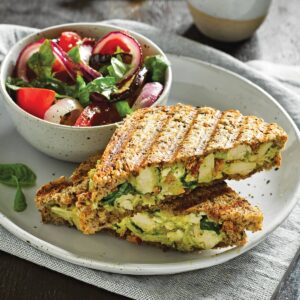
Fermented foods are so popular — but do we really need to consume them? Dietitian Caroline Trickey takes a closer look.
What is fermented food?
Fermentation has been around for hundreds of years, long before refrigerators were invented and food chemicals were used to preserve food. ’Fermented’ means food or drink has undergone a controlled process in which microorganisms such as yeast and bacteria are introduced to break down sugars into simpler molecules. A starter culture is often used, but this can be as simple as pickling vegetables in water and salt.
Fermentation increases shelf life and can enhance flavour, texture and appearance, also allowing a food’s nutrients to be better absorbed by your body.
What can it do?
Some claim fermented foods reduce the risk of cardiovascular disease, diabetes, allergies and inflammation, or help you manage your weight, improve mood and brain activity, or can boost bone health and increase recovery after exercise.
The evidence for most of these claims, however, is limited and largely anecdotal. Research is now focussing on fermented foods in relation to digestive health and bowel regularity — particularly gas and bloating — but as yet there’s still little strong science.
What are probiotics?
Fermented foods are a potential source of probiotics — the good gut bacteria living inside your gut which, in adequate amounts, may benefit your health.
Probiotic-containing fermented foods are being seen as a way to manipulate the microbiome —your gut’s eco-system — so that ‘good’ bacteria can help improve the overall balance of bacteria in your gut and boost your health.
Are all fermented foods probiotics?
Not all fermented foods contain probiotics. Some fermented foods don’t retain live cultures. Many shop sauerkrauts and other fermented products undergo pasteurisation, a form of heat processing which kills most of the beneficial bacteria.
So, if you want fermented foods with beneficial bacteria that may still be alive at the time you eat them, look for ‘raw’ or untreated fermented foods. And — for the probiotics to benefit your health — you have to regularly eat a reasonable amount.
What you need to know about fermented food
If you’d like to taste-test fermented foods, HFG has some of our favourites below. Include them as part of a high-fibre intake — and eat plenty of prebiotics such as onions, leeks, asparagus, oats and bananas. Prebiotics are in the foods that feed your good gut bugs. Without them, your probiotics wouldn’t survive!
7 common fermented foods to try
1 Yoghurt
Thick, creamy fermented milk, best eaten with a spoon
2 Kefir
A fermented milk drink, a sort-of- drinkable yoghurt
3 Kombucha
A fermented black or green tea drink
4 Sauerkraut
Pickled cabbage
5 Kimchi
A Korean pickled vegetable condiment/ side dish
6 Miso
Fermented soy bean paste
7 Tempeh
Fermented soy beans made into a patty
And of course…
Wine, beer and cider
The bottom line…
If you’re healthy and eat well, you probably won’t notice any benefits from fermented foods — but including them can certainly make your menu more fun and interesting!
www.healthyfood.com










